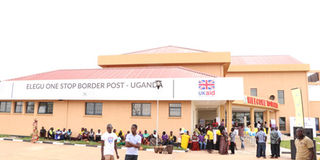South Sudan aligns customs operations with trade partners

Elegu border post is expected to facilitate trade between Uganda and South Sudan as well as the entire region. PHOTO BY ISMAIL MUSA LADU
What you need to know:
The agreement signed barely a fortnight ago in the South Sudan capital, Juba, commits South Sudan’s National Revenue Authority and TradeMark East Africa into establishing a modern trade systems and procedures to support faster clearance and transiting of goods
To make the most out of regional trade while diversifying from reliance on oil revenues, South Sudan’s revenue collection body has partnered with an aid-for-trade organisation.
The Memorandum of Understanding (MoU) which the South Sudan’s National Revenue Authority (NRA) signed with TradeMark East Africa (TMEA), if implemented to the dot, could according to regional trade analysts, improve the trading environment of the newest country in the world with her regional peers and neighbours.
The MoU signed barely a fortnight ago in the South Sudan capital, Juba, commits the two into working towards establishing a modern trade systems and procedures to support faster clearance and transiting of goods.
This builds on the work that TMEA in partnership with the Juba governments is undertaking at Elegu-Nimule border, the main crossing point between Uganda and South Sudan.
Given the prevailing situation, it became apparent that attention will be given to enhancing faster clearance and movement of humanitarian goods coming into South Sudan aiming to halve the time it takes from the current two days to one day or even less.
According to the South Sudan Commissioner General, National Revenue Authority, Dr Olympio Attipoe, the uncertainties surrounding consignments destined for South Sudan have been a major challenge. Cases of delayed container freight stations in Mombasa, disappearance of cargo and theft have been rampant and documented.
But with the implementation of the deal, this will be a thing of the past because it will ease the movement of South Sudan bound cargo from the port of entry, in this case either Mombasa or Dar es Salaam to the South Sudan borders.
In his speech, the chief executive officer of TMEA, Mr Frank Matsaert, said: “Our philosophy is anchored on the belief that by promoting trade and integration, developing and least developing countries in Africa can prosper and meet the aspirations of their citizens; such as economic independence; peaceful coexistence within and without national boundaries; and other rights as enshrined in the Universal Declaration of Human Rights.”
Trade, he says, is a catalyst for peace and harmonious coexistence between communities within and without our borders.
“By creating frameworks that promote dialogue for peace and stability that bring together the private sector and the government, we are convinced that gradual steps towards resolving the current political situation will be possible,” Mr Matsaert said.
Benefits
Some of the envisioned projects, thanks to the MoU include; the Regional Electronic Cargo Tracking system (RECTs), which is currently implemented along the Northern Corridor in Kenya, Uganda, Rwanda and Democratic Republic of Congo in cooperation with the Revenue Authorities and Customs Administrations.
RECTs directly decreases transit costs by reducing lengthy transit times caused by physical checks in transit countries.
South Sudan has on several occasions expressed interest to adopt the cargo tracking system within its borders. This, according to Dr Attipoe, will reduce cost of security bonds, incidences of theft and diversions while enhancing security along the transit highway to Juba.
In addition, NRA and TMEA will support trade facilitation initiatives that have been agreed upon and ratified by the government of South Sudan including its access and utilisation of all World Customs Organisation’s instruments and services, aligning its operations to those of other East African Community’s member states.
To improve efficiency in trade, the two partners will devise online systems, such as Trade Information Services Platform. This will provide information on international trade regulations and requirements.
It will also map trade networks and other trade-related information as defined and explained in the World Trade Organisation’s Trade Facilitation Agreement (Bali Agreement). Other projects that the partners are exploring include establishment of a Single Window Trade System for South Sudan.
For the above benefits to be realised within the next three to five years, the peace situation in the neigbouring country must be resolved.
Challenges
RECTs is a web-based integrated system used to monitor transit cargo from departure (point of loading) to final destination within the countries where it is operational.




